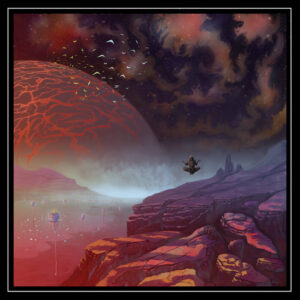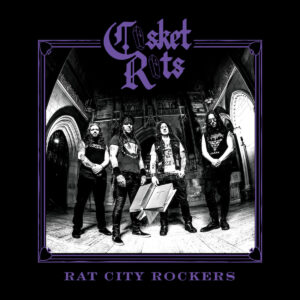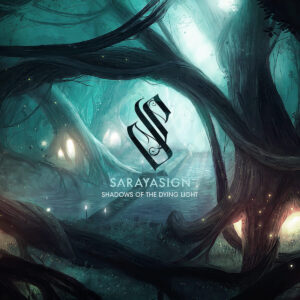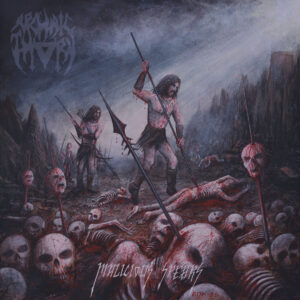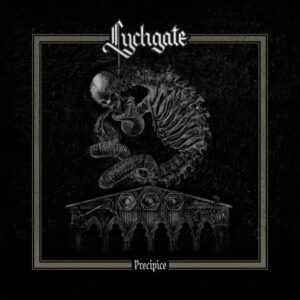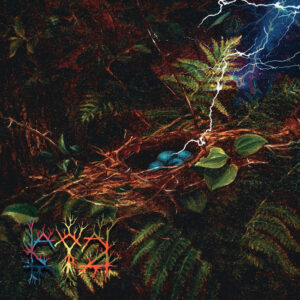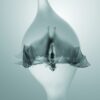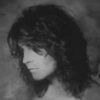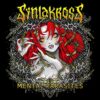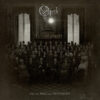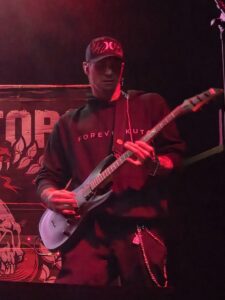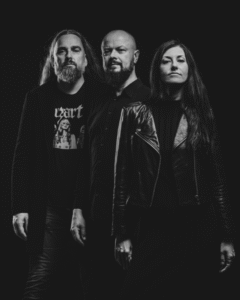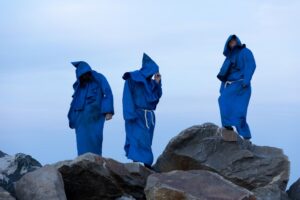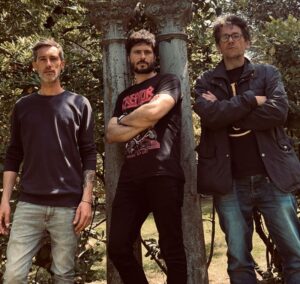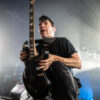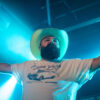Quantum Leap
Gus G.
•
November 4, 2021
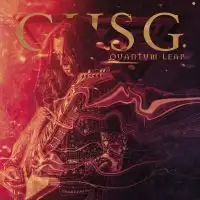
GUS G. is a founding member of the band FIREWIND and has recorded and toured with the likes of MYSTIC PROPHECY, NIGHTRAGE, ARCH ENEMY, DREAM EVIL, and OZZY. The Greek-born guitarist has also established himself as a solo artist, releasing three albums under his own name between 2014-2018. "Quantum Leap" (released October 8, 2021) is his fourth individual outing. Assembled in pieces, "Quantum Leap" features both new compositions and material from GUS G.'s "riff vault," his repository of unfinished ideas. The digital, CD, and DVD versions of the album clock in at a hefty 1 hour, 17 minutes, but in actuality represent two distinct efforts packaged under one name. The first 11 tracks (CD 1) are studio recordings (45:53), whereas the sterility of the recording booth is eschewed on CD 2 in favor of a live concert set (7 tracks, 31:11).
As GUS G. himself makes clear in the album's promotional package, he cannot stand most instrumental guitar albums because everything sounds the same. Honestly, I typically share this sentiment. On "Quantum Leap" he wanted to avoid the trap of making what might be considered the stereotypical "guitar hero shred album." He has, for the most part succeeded.
"Into The Unknown," the tempo shifting CD 1 opener, has a prog sensibility, as does the album's third track, "Quantum Leap." Both feature some fierce, high speed shredding, as do many tracks on the album. "Exosphere," the second track, has a spacey, ephemeral feel consistent with the title of the song (the exosphere being the uppermost level of the Earth's atmosphere that transitions into space). At times a solid, fuzzy riff is heard weaving through this almost experimental number.
GUS G. does tap into the more rock and metal side of things on CD 1. This is first heard on the fourth track, "Chronesthesia," which has a traditional hard rock feel. It includes a nice riff that, instead of being just part of a song, could have been expanded into a good tune by itself. This is a frustration of mine throughout the album; too often really good ideas are thrown out there as an element of a song, but then never elaborated upon or simply abandoned. In several instances, such as on "Chronesthesia," these ideas could have served as the foundation for solid rock songs.
"Enigma of Life," the fifth track, is a bit slower, a bit sparer than that which comes before. It progressively builds in melodic density and GUS G. doesn't lean so heavy on the fretboard fireworks. CD 1's penultimate track, "Not Forgotten," left a similar impression. Perhaps then the reason "Enigma of Life" and "Not Forgotten" are two of my favorites is because of the aural simplicity they offer in comparison to the tracks surrounding them.
Tracks six through eight also mine the rock and metal vein. The intro to "Judgment Day" was quite simply mind blowing, forcing me to auditorally re-center myself upon its conclusion. "Judgment Day's" rhythm and melody evoked power metal, especially as this song, like "Chronesthesia" before it," had more of a bottom end. Though a bit thrashy in places, "Fierce" was primarily built around a more methodical metal groove, giving it a NWOBHM tone. The NWOBHM inflections could even be heard in the solo lines. One of the more interesting features of this track were the percussive accents scattered throughout. The last song in GUS G.'s "run of rock" is "Demon Stop," with its solid, marching foundational groove.
"Night Driver" (track 9) while good, exemplifies one of my major complaints with the studio portion of "Quantum Leap." Namely, the guitar playing has a studio sterility to it that makes is sound almost like a synthesizer. "Night Driver" is glorious in its technical complexity (as are most of the songs of CD 1), but falls victim to being somewhat overproduced and too highly structured. It feels too perfect, too safe, if that is such a thing with a guitarist of GUS G.'s caliber who is obviously taking risks by playing such demanding pieces.
CD 1 ends with "Force Majeure," a thrashy song that has shredding aplenty. Fellow guitar wiz Vinnie Moore is featured on the track, enabling GUS G. to demonstrate that he can lay down some impressive tandem work when another player is in the picture.
CD 2 is a live recording of GUS G. and his band (not FIREWIND) in concert. One immediately hears a drop off in the quality of the overall recording, which is to be expected considering the conditions under which the two different portions of "Quantum Leap" were produced. By "drop off" I'm not saying CD 2 is akin to "bootleg quality," it's just a bit more muted and not as pristine as what I'd been listening to previously. And let me add, without all the bells and whistles, CD 2 was my favored portion of "Quantum Leap," having a level of authenticity that CD1 was sometimes lacking.
The increased authenticity is immediately apparent on track 12 (the first of CD 2), "Fearless." This is a solid rocker, the guitar sounding more like a guitar; free of the "synthy" tonality that too often creeped into CD 1.
Tracks 13 and 14, "Mr. Manson" and "Letting Go," respectively, are excellent metal songs and two highlights (at least for me) of the 18 song collection. "Mr. Manson" is a driving song that could very easily appear on any OZZY album, though Dennis Ward is just fine on vocals. "Letting Go" is a little more thrashy. Both songs have the solid bass core characteristic of the metal genre. GUS G.'s playing is somewhat restrained on both tracks, especially "Mr. Manson," fitting into the song, rather than being the song.
"Cold Sweat" (track 15) by THIN LIZZY is one of two covers on CD 2, the other being DIRE STRAIT's "Money For Nothing" (track 17). Both are a little harder, a little denser than the originals, especially "Money For Nothing." This is not a criticism, just an observation, as I really liked both just fine (the DIRE STRAITS cover probably more than the original, in fact). GUS G.'s solo on "Cold Sweat" was ear catching, having more of a symphonic style to it than LIZZY's version.
"Force Majeure" makes its way onto the live CD. The best way to describe it live is to say that it's "more real." By that, I mean it's toned down and not as extravagant as the studio version. GUS G. still takes flight on the solo, but his playing is more in check. Also different is the bottom end, this performance featuring more bass. Overall, if forced to choose between the studio or live version, the live is easily my choice.
The album closes with "Thrill Of The Chase," another solid rocker that puts me in mind of more uptempo NWOBHM.
GUS G. offers a little something for everybody on "Quantum Leap," with the guitar, as can be expected, the center of attention. Rather than just shredding, however, GUS G. does incorporate his fretboard mastery into the structure of most songs, particularly the concert recordings. The songs are technically complex, well structured, and played with seamless style and tempo changes. Unfortunately, this causes a certain degree of artificiality on GUS G.'s studio work, leaving me to prefer the in-concert portions of the album.
8 / 10
Excellent
Songwriting
Musicianship
Memorability
Production

"Quantum Leap" Track-listing:
1. Into The Unknown
2. Exosphere
3. Quantum Leap
4. Chronesthesia
5. Enigma Of Life
6. Judgement Day
7. Fierce
8. Demon Stomp
9. Night Driver
10. Not Forgotten
11. Force Majeure
12. Fearless (Live)
13. Mr. Manson (Live)
14. Letting Go (Live)
15. Cold Sweat (Live)
16. Force Majeure (Live)
17. Money For Nothing (Live)
18. Thrill Of The Chase (Live)
Gus G. Lineup:
Gus G. - Guitars
Dennis Ward - Bass, Vocals
Will Hunt - Drums
More results...
